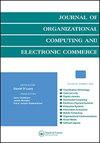UNDERSTANDING PRIVACY PARADOX: AN EXPERIMENTAL APPROACH TO STUDY PRIVACY CONCERNS AND ACTUAL DISCLOSURE AMONG APP USERS
IF 1.9
4区 管理学
Q3 COMPUTER SCIENCE, INFORMATION SYSTEMS
Journal of Organizational Computing and Electronic Commerce
Pub Date : 2023-08-31
DOI:10.1080/10919392.2023.2251328
引用次数: 0
Abstract
ABSTRACT Consumers increasingly protest invasions of privacy by digital applications and platforms, yet they habitually reveal more information than their disclosure intent. This paradoxical behavior has been explained using rational and irrational reasons (cognitive biases and heuristics), but they have been essentially conjectural. Thus, in this research, we empirically verify the existence of the privacy paradox and test four such reasons using quasi-experiments: privacy calculus as a rational explanation, information asymmetry as part of bounded rationality, bandwagon effect as a cognitive bias, and trust as a decision-making heuristic. A dummy app was developed to collect data from 594 mobile application users. The existence of the privacy paradox was tested using regression between privacy concern and actual disclosure. Following this, the reasons for the privacy paradox were tested using ANOVA. We concluded that privacy paradox exists in the defined sample, and the two reasons that explain the privacy paradox are information asymmetry and the peanut effect.理解隐私悖论:一种研究应用程序用户隐私问题和实际披露的实验方法
本文章由计算机程序翻译,如有差异,请以英文原文为准。
求助全文
约1分钟内获得全文
求助全文
来源期刊

Journal of Organizational Computing and Electronic Commerce
工程技术-计算机:跨学科应用
CiteScore
5.80
自引率
17.20%
发文量
7
审稿时长
>12 weeks
期刊介绍:
The aim of the Journal of Organizational Computing and Electronic Commerce (JOCEC) is to publish quality, fresh, and innovative work that will make a difference for future research and practice rather than focusing on well-established research areas.
JOCEC publishes original research that explores the relationships between computer/communication technology and the design, operations, and performance of organizations. This includes implications of the technologies for organizational structure and dynamics, technological advances to keep pace with changes of organizations and their environments, emerging technological possibilities for improving organizational performance, and the many facets of electronic business.
Theoretical, experimental, survey, and design science research are all welcome and might look at:
• E-commerce
• Collaborative commerce
• Interorganizational systems
• Enterprise systems
• Supply chain technologies
• Computer-supported cooperative work
• Computer-aided coordination
• Economics of organizational computing
• Technologies for organizational learning
• Behavioral aspects of organizational computing.
 求助内容:
求助内容: 应助结果提醒方式:
应助结果提醒方式:


